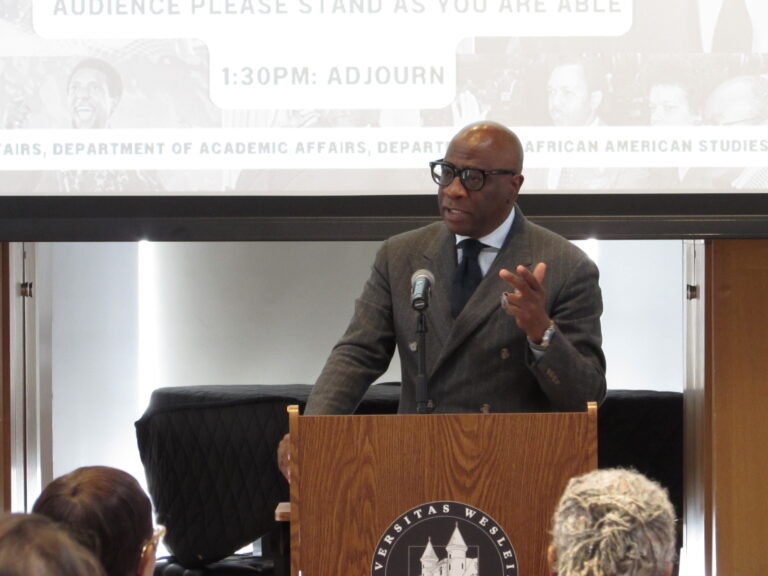University Issues Ultimatum to Beta
The administration announced yesterday in an all-campus e-mail an amendment to the housing agreement that would ban students from visiting or living in “houses or property owned, leased or operated by private societies that are not recognized by the University.” Anyone caught violating the new policy, which will be effective in the fall, will be subject to disciplinary action, including suspension. According to Vice President of Student Affairs Mike Whaley, who sent the all-campus e-mail, the policy change is targeted at Beta Theta Pi (Beta), which, for six years, has not been recognized by the University.
“What we’re doing is we’re setting up Beta to make an intentional decision,” Whaley said. “What I have been telling the Beta leadership for many, many months now is that the status quo is not tenable from our perspective. And so we don’t want to continue forward having the relationship that we have had for these past several years.”
According to Beta President Jeff Tanenbaum ’12, the University notified him, the leaders of the Baird Association—Beta’s alumni association that owns the Beta property—and the District Chief of the National Beta Fraternity of the new policy via conference call two weeks ago. Tanenbaum said Beta members were upset by the news.
“Not happy would be the general feeling here,” Tanenbaum said. “If there wasn’t this [threat of] suspension, there’s no way we’d be on-campus next year. We’re pretty upset that they’re basically forcing us to go on.”
According to Whaley, however, some current Beta members have expressed interest in having the fraternity rejoin the campus, which influenced the passage of the amendment. Since the Baird Association owns the property, it is ultimately up to the alumni association whether or not to agree to the University’s terms.
“I think some of the current undergrads in Beta indicated some interest in being part of program housing,” Whaley said. “But the alumniassociation has said, ‘we’re not sure yet, we don’t feel comfortable agreeing to come into program housing.’ So we felt, given that, we had to move forward with the policy change, and essentially have them make a decision one way or the other.”
But according to Tanenbaum, the assertion that any Beta member is interested in voluntarily having the fraternity rejoin the campus is false.
“That’s absolutely not true,” Tanenbaum said. “The only reason why we indicated interest is because we didn’t want to be suspended.”
Whaley said that he and President Michael Roth came to the decision to change the housing policy after consultation with Roth’s senior staff. The president of the Wesleyan Student Assembly (WSA) and the chair of the WSA Student Affairs Committee were notified in advance about the amendment, in addition to the members of Beta.
Negotiations over the autonomy of Beta have been ongoing for over three years, but the relationship between the fraternity and the University has become increasingly contentious. Last March, an e-mail sent by Whaley and Dean of Students Rick Culliton to all students and parents advised students to refrain from visiting Beta because of frequent hospitalizations due to the overconsumption of alcohol. Last November, Beta was again plunged into controversy after a student reported that she was raped at the fraternity on Oct. 31. The University sent out another e-mail warning students to avoid Beta. A non-student has since been arrested and charged with first degree sexual assault.
In an e-mail to The Argus, Baird Association President Adam Diamond maintained that the fraternity was not especially unsafe.
“We do not believe that the Beta House is any less safe than other Wesleyan-owned properties,” he wrote. “It is impossible to eliminate all bad things from happening around a college campus; we believe it is best to encourage undergraduates to make responsible decisions in a real world environment.”
The Administration rejected an amendment to the policy proposed by the Beta leadership that would clarify the protocol that Public Safety (PSafe) will follow when responding to events at private residences. According to Whaley, the reason that the proposed amendment was rejected was because it limited PSafe’s ability to respond to safety issues and policy violations. Also, any changes would apply to all private properties including Alpha Delta Phi, Delta Kappa Epsilon, and Psi U.
Whaley said that while the administration is still negotiating with the Beta leadership, it will stand firm on the new amendment.
“I don’t think that we’re really going to negotiate the language of the agreement much more, but we’re of course willing and hopeful that we’ll continue discussions and that they will eventually agree to sign on,” Whaley said.
According to Tanenbaum, in the interest of preserving Beta’s place on campus, current members are willing to sign the agreement if it is approved by the alumni association.
“Beta at Wesleyan has been here since 1890, so we hope that we can continue into the foreseeable future,” he said. “So if it comes to where we have to sign the contract to have that happen then we’re definitely going to sign the contract rather than risk ending everything.”
One parent of a Beta member who wished to remain anonymous criticized the University for the policy change.
“The administration had been pursuing for several years a strategy of intimidation, harassment, wildly exaggerated misinformation and bad faith negotiation,” said the parent in an e-mail to Diamond. “Now that these strategies failed they have resorted to the nuclear option. Because it is a private institution, due process is not required. Thus they will succeed, but students should be aware that something is rotten in the state of Connecticut.”
Whaley recommended that any student contemplating living in Beta next year should enter General Room Selection (GRS) or apply for University-recognized program housing to ensure that they have a legal living arrangement next year. If, after GRS, the alumni association agrees to join University housing, students still wishing to live in Beta can be transferred there.
Tanenbaum said if Beta does become part of program housing, one good outcome would be a defrosting of Beta-University relations.
“A good product of this is that we’ll be able to get a better relationship with the University rather than one where they can’t even acknowledge we exist,” he said. “And the good things we do will also be publicized and not just the bad things, as the University’s current policy is.”







I am very surprised that Beta did not sue Dean Whaley on grounds of extortion. If that happens, who will win?
Not a good message.
Looks like university out of control on this issue and throwing in the towel.
Surprise, surprise. The university dictatorship looks to destroy another fraternity at all costs. Same persecution doomed Chi Psi several years back. So much for diversity. Say goodebye to another chunk of donations from disgruntled alums.
I will no longer donate to Wes
Wesleyan just lost my donations as well.
Just wondering, hypothetically speaking of course – that Mayor Guiliani successfully pulled off a drug raid at the president’s beloved Alpha Delta Phi.
How would the university act?
“New Policy at Wesleyan University Makes a Mockery of Freedom of Association” – http://thefire.org/article/12872.html
I will increase donations to Wes and stand behind the admin on this one. Why in 3 years haven’t the Betas addressed issues of toxic alcohol consumption and sexual assault? President Diamond – do you really think this is a “real world” environment? Not my world.
Well the good news is that Wes doesnt own Beta otherwise it would have been strafed or otherwise demolished by now.